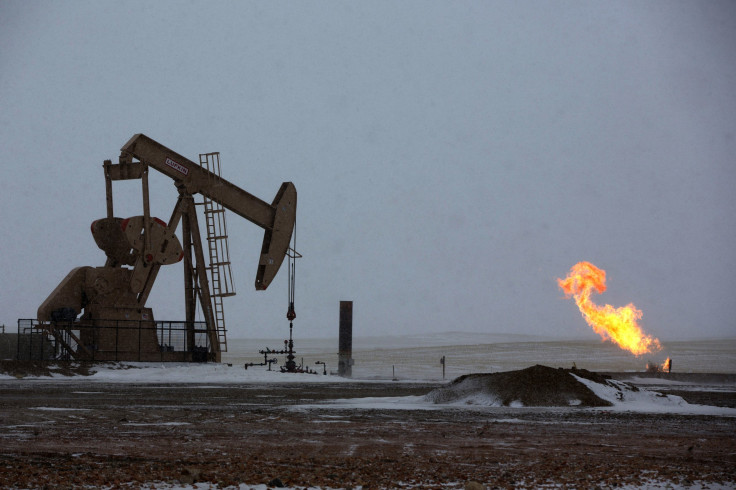Oil and Gas Companies Are Dodging Workers' Compensation Payments In North Dakota

Oil and gas companies in North Dakota owe the state more than $800,000 in unpaid workers’ compensation insurance premiums, International Business Times has learned. The companies receive the benefits of the state-run insurance policy -- chiefly, they cannot be sued in the case of employee injury or death -- but they have been delinquent in paying the costs.
Oil and gas extraction is one of the deadliest industries in the United States, but it’s especially fatal in lightly regulated North Dakota, where the sector’s death rate is more than six times the national average. Due in large part to the oil boom, the state now has the highest workplace fatality rate in the nation. Fifty-five North Dakota workers died from occupational injuries in 2013, the most recent year for which the Bureau of Labor Statistics has data; 12 of them worked in oil, gas and mining.
Nevertheless, North Dakota’s drillers are disproportionately dodging their insurance obligations. The sector employs less than 3 percent of the state’s workforce, but accounts for 8.6 percent of its $8.6 million in unpaid premiums, according to data provided to IBTimes by North Dakota Workforce Safety & Insurance, a state government agency.
“I think it’s completely irresponsible that companies profiting off the one-time harvest of our state’s natural resources aren’t respecting our state laws meant to ensure that our workforce has a safe work environment,” Democratic state Rep. Josh Boschee says.
“Either we have companies that come here and take advantage of the system, or we have companies that are just not being properly monitored,” Democratic state Sen. George Sinner says.
The high sum is especially jarring since North Dakota has the lowest workers' compensation premiums in the nation. The state’s average monthly premium rate of 88 cents per $100 of payroll falls well below the $1.85 nationwide median.
“The North Dakota fund is awfully employer friendly,” Dean Haas, a Bismarck-based lawyer who represents oil and gas workers injured on the job, says. “The whole thing exists to bring employers to the state -- look at how the low the premiums are. To hell with workers getting injured.”
Employees at companies that aren’t paying premiums can still file claims and receive benefits. The group of delinquent oil and gas companies maintains active workers' compensation accounts, something that is required by state law. The issue is separate from employers that do not open accounts at all and therefore incur more legal liability in the case of workers injured or killed on the job.
If a company doesn’t pay up, the state waits 60 days before assessing employers a penalty interest of 2 percent per month on outstanding balances. The state does not disclose how much individual employers owe nor how long active accounts have been delinquent. The average delinquent account stands at $7,553.
Even companies with records of recent on-site fatalities in North Dakota -- namely, Texas-based JP Energy Partners and Utah-based Frontier Drilling -- are delinquent on their payments.
In July 2013, a truck driver for a JP Energy-owned firm died as he inspected a gas tank outside of Watford City. The Occupational Safety and Health Administration (OSHA) suspected hydrogen sulfide poisoning but was unable to find enough evidence and never issued a fine. A claim for workers’ comp benefits was denied. Meanwhile, Frontier Drilling, whose trademarked slogan reads “Safety, It’s My Job,” saw two deaths on rigs outside of Stanley in 2012. In March, a worker died after falling 75 feet. Months later, another worker died in a tank explosion. OSHA fined Frontier $3,500 in the first case and $6,000 in the second case.
JP Energy declined to comment. And an official from Frontier did not respond to requests for comment.
Critics say the high tab that oil and gas companies have run up is emblematic of an insurance program in dire need of reform. The state's agency employer-friendly stance long predates the recent drop in oil prices, which has driven energy companies to cut staff and scale back spending.
“If I were to compare this to my business as a commercial banker, this delinquency rate would be very high and would indicate that corrective action needs to be implemented,” Sen. Sinner says. “Since this is a government agency, and not a private insurance company, the business client is allowed to remain covered even after going delinquent on their payments.”
"The fact that North Dakota leads the nation in workplace fatalities and is at the bottom when it comes to premium rates paid by employers is a striking incongruity," Democratic state Sen. Mac Schneider, who is also a labor lawyer, says. "Our workers are the ones paying for it."
© Copyright IBTimes 2024. All rights reserved.





















